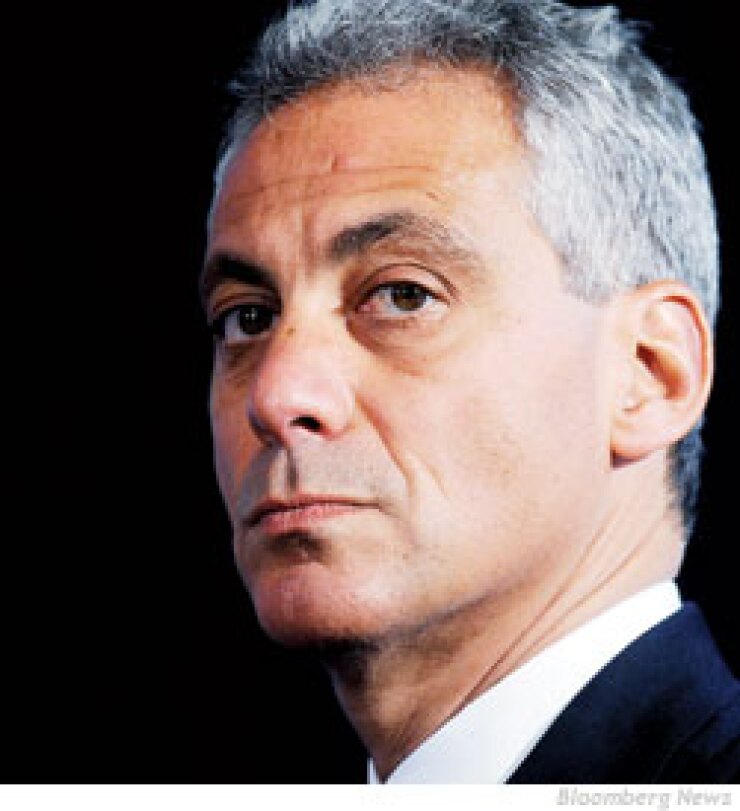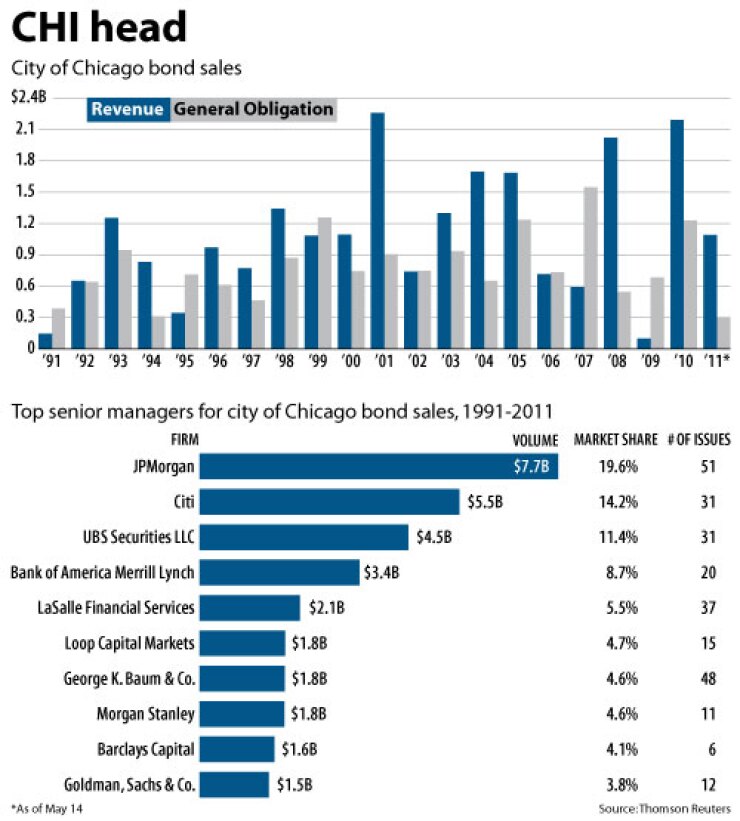

CHICAGO — After more than two decades in office, Chicago Mayor Richard Daley on Monday hands the reins over to Rahm Emanuel, leaving behind a legacy highlighted by major bond-financed projects and infrastructure investment, but marred by the city’s daunting fiscal challenges.
“Mayor Daley was a builder and his number one goal was to enhance the city’s world-class status, but he is leaving the bills behind,” said Richard Ciccarone, chief research officer at McDonnell Investment Management LLC. “The new mayor is going to have to be a warrior and a conciliator” to tackle the city’s fiscal challenges publicly and politically, he said.
Emanuel, a former congressman and presidential chief of staff, last week released a transition report warning that a projected $700 million budget deficit looms in the next year. That figure is higher than the $587 million figure the city’s finance team announced a week earlier.
The city also faces an additional $550 million in pension contributions beginning in 2015 under an Illinois mandate. The city’s four pension funds, which have $14.6 billion of unfunded liabilities, are in dire shape with a funded ratio of just 43%.
Daley has held property taxes and services steady, instead dipping heavily into reserves established with his pioneering asset-privatization deals to close record levels of red ink over the last two years.
The incoming mayor has pledged to shake up the foundation of city government which likely translates into changes in services, personnel, and some tax structures. Emanuel said he plans to cut $75 million from the $6.15 billion 2011 budget and freeze spending. He released a transition report last week outlining goals.
“In the past few years, the budget has been balanced mainly through one-time fixes such as depleting asset reserve funds, instituting employee furlough days, and restructuring debt. These short-term approaches are no longer available — nor should they be our answer to a problem that goes much deeper. If ever there was a time for urgent change, the time is now,” the report said.
The plan calls for a shift towards long-term planning at the city and its agencies that Emanuel will shape through his appointment powers. Those agencies include the Chicago Board of Education, the Chicago Transit Authority, the Chicago City Colleges, and the Chicago Park District.
Emanuel also last week announced a City Council reorganization plan that is expected to win council approval this week. A new council in which 18 of the 50 aldermen are newly elected takes office with Emanuel.
Under the plan, the number of committees will shrink to 16 from 19. Longtime Finance Committee chairman Edward Burke, who backed Emanuel’s mayoral opponent Gery Chico in the race, will retain his post. The plan hands some of Burke’s power over legislation to close Emanuel ally Patrick O’Connor, but Burke will still hold sway over city bond deals.
Emanuel has tapped advisory professional Lois Scott, a principal at Scott Balice Strategies LLC, to serve as his chief financial officer. Alexandra Holt, a former city deputy budget director and lawyer, will fill the job of budget director, and former Ohio treasurer and chief financial officer Amer Ahmad will serve as comptroller.
Fiscal challenges drove a series of downgrades last year. Fitch Ratings dropped Chicago’s $6.8 billion of general obligation bonds one notch to AA-minus and Standard & Poor’s dropped the credit to A-plus. Moody’s Investors Service in August lowered the GOs to Aa3. All three agencies have stable outlooks.
The city must reduce personnel costs, which account for 80% of the general fund, and adequately fund its pension obligations to “stabilize its deteriorating financial condition,” said Laurence Msall, president of the Civic Federation of Chicago, a local business-backed government tax policy and fiscal review organization.
Daley, who announced last fall he would not seek a seventh term, leaves a legacy that is highlighted by major building projects. Msall said “the challenge for the next mayor will be to continue those investments and close the over $550 million operating deficit.”
Daley shepherded a $400 million bond-financed plan to expand Soldier Field for the National Football League’s Chicago Bears through city and state approvals in 2001 despite critics who said the design marred the historic stadium.
Daley, who last year surpassed his father Richard J. Daley’s mayoral tenure, in 2001 unveiled what has grown into an $8 billion plan to expand O’Hare International Airport. The city recently sold $1 billion of debt towards financing remaining projects under the plan after resolving a dispute with the airport’s major airlines over the timing of projects. The agreement likely pushes off completion to at least 2016 from 2014.
Daley also presided over the planting of record numbers of trees, plants and flowers along streets, boulevards, downtown and in the parks. He relied heavily on tax-increment financing to revitalize the thriving downtown that has undergone a residential and commercial boom, but critics counter that some neighborhoods benefitted little from his economic development investments. Daley launched a bond-financed neighborhood infrastructure building boom, constructing new branch libraries and replacing aging police and fire stations.
Though beneficial “the projects were not inexpensive,” Ciccarone said of the city’s growing debt levels. The investment, however, did stave off greater losses of corporations and population seen by other major cities over the last two decades
During Daley’s tenure, the city’s GO debt has dramatically increased to $6.8 billion. The direct tax-supported debt burden rose 122% between 2000 and 2009 to $6.9 billion, the Civic Federation reported. Ciccarone said the city’s net direct per-capita debt burden stood at $2,468 per person in 2009, up from $2,094 in 2005, and compares to a national urban median of $789 in 2009.
Chicago so far this year has sold $1.1 billion of revenue debt and $230 million of GO debt. Last year, it sold $2.2 billion of revenue-backed debt and $1.2 billion of GOs, according to Thomson Reuters. The city issued a total of $16.4 billion in new-money and refunding GOs in 116 deals over the last 20 years and $22.9 billion of revenue-backed debt in 278 deals.
The top 10 underwriters of city debt include JPMorgan, Citi, UBS Securities LLC, Bank of America Merrill Lynch, the former LaSalle Financial Services, Loop Capital Markets LLC, George K. Baum & Co., Morgan Stanley, Barclays Capital, and Goldman, Sachs & Co.
Regional and minority-owned firms dominate the next 10.
Daley’s accomplishments include his successful efforts to win back control of the Chicago Public Schools from the state in 1995. He appointed his own leaders who helped restore financial and academic credibility to the system leading to a massive $5 billion, mostly bond-financed capital building program. The system, however, is still struggling academically and is facing a $720 million budget deficit.
Daley won back control of the Chicago Housing Authority from federal authorities in 1999 and launched the partially bond-financed $1.6 billion Plan for Transformation. Senior facilities and low-rise buildings are being renovated under the plan and crime-ridden high rises were torn down and are being replaced with mixed-use developments supported by private development. The plan is behind schedule due to the housing crisis.
At first criticized for reneging on a pledge not to use public funds to help cover the growing costs of the new Millennium Park downtown, he has won widespread praise for the park’s concept and status as a major tourist draw.
Daley, accustomed to winning his way politically, suffered one of his greatest defeats at the hands of the International Olympic Committee which in 2009 rejected the city’s bid to host the 2016 Summer Games.
Daley pioneered the path to asset privatization with the 99-year lease of the Chicago Skyway toll bridge in 2005 for $1.8 billion. He went on to strike leases involving downtown city parking garages and the parking meter system.
Daley has nearly drained reserves set up with proceeds from the $1.15 billion meter lease to help balance the last two budgets, but a $500 million reserve funded with Skyway proceeds remains intact. That reserve helped garner a round of upgrades in 2005. A proposed $2.5 billion lease of Midway Airport fell apart in 2009 due to the international credit crunch. The city had banked on the Midway deal to help shore up its pension funding.
Daley has come under fire for the meter deal because of the private firm’s poor implementation and skyrocketing parking costs and his use of proceeds to balance city budgets.
Supporters counter that Daley established the city’s first reserve with the Skyway proceeds and has left that intact. “It was a monumental task. And it should not be underestimated how difficult it was to deliver a balanced budget, year after year, while facing a substantial loss in revenue and protecting the taxpayers from higher taxes and fewer services,” chief financial officer Gene Saffold said earlier this month.
During his tenure, Daley grew close to the city’s business leaders, including the banks that underwrite bond deals. He has tapped local public finance professionals to serve on boards and enjoyed financial support from broker-dealer parent corporations and law firms for civic projects.
Local minority and women-owned public finance businesses also have strong praise for Daley’s commitment to dole out at least 25% of the city’s bond work to minority-owned firms and 5% to women-owned firms. Public finance sources said Emanuel is unlikely to erode those gains.





